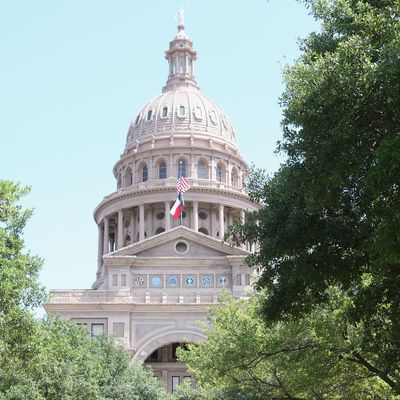
Democratic lawmakers in the Texas House staged a walkout late Sunday night which broke quorum and, at least temporarily, blocked a GOP-led bill which would enact a range of new voting restrictions in the state. Senate Bill 7, which Texas Republicans finalized Saturday and the Texas Senate passed early Sunday morning, would cap voting hours, bar drive-thru voting, add multiple new rules for mail-in voting, and prevent local expansion of voting options, among other measures. It is part of a nationwide wave of state-level efforts to restrict voting rights by Republican lawmakers following Biden’s victory last year, which Donald Trump and his allies continue to attempt to discredit. The Texas bill, which still seems likely to become to law despite state Democrats’ efforts to stymie it, seems primarily designed to roll back and prevent further efforts to expand voting access in the state’s largest and most diverse counties, where many Democratic voters and voters of color reside.
The state’s Republican governor, Greg Abbott, indicated in a tweet on Sunday night that a special legislative session would be scheduled to pass SB 7 and other bills derailed by Democrats late-night maneuver. It’s not yet clear when that session will happen. The chair of the state’s House Democratic Caucus has vowed to continue to fight the bills with “every tool in our toolbox.”
President Joe Biden called the impending legislation “wrong and un-American” in a statement Saturday. Biden said the bill was “part of an assault on democracy that we’ve seen far too often this year — and often disproportionately targeting Black and Brown Americans.”
“In the 21st century, we should be making it easier, not harder, for every eligible voter to vote,” he continued.
On Saturday, lawmakers in Texas’ Republican-controlled House and Senate released the final version of SB 7, which combines different pieces of voting restriction legislation from each chamber. As the Texas Tribune reported Saturday, in addition to the ban on 24-hour and drive-thru voting — which almost 140,000 voters used in the state’s most populous area, Harris County, last year — the final bill:
requires more counties to offer at least 12 hours of early voting each weekday of the last week of early voting, but sets a new window of 6 a.m. to 9 p.m. for voting. This would directly preempt Harris County’s 24-hour voting, which it planned to keep for future elections. It would also slightly shorten the extra hours other large counties offered in the last election by keeping their polling places open until 10 p.m. — three hours past the usual 7 p.m. closing time — for at least a few days. The draft also sets a new window for early voting on Sundays, limiting it from 1 to 9 p.m.
The SB 7 draft also makes it a state jail felony for local officials to proactively send mail-in ballot applications to voters who did not request them. This is another response to Harris County, where officials attempted to send applications to all 2.4 million registered voters last year. Other Texas counties sent applications to voters 65 and older without much scrutiny. Although those voters automatically qualify to vote by mail, mailing unrequested applications to them in the future would also be banned.
The bill also restricts who is allowed to vote absentee, and requires mail-in voters to include either the last four digits of their Social Security number or their driver’s license number on their ballots and the backs of the return envelopes they send them in with. Per the Tribune, SB 7 also “expands the freedoms of partisan poll watchers”:
Currently, poll watchers are entitled to sit or stand “conveniently near” election workers. SB 7 would entitle them to be “near enough to see and hear” the election activity. The draft also adds language to the Texas Election Code to allow them “free movement” within a polling place, except for being present at a voting station when a voter is filling out a ballot.
The New York Times adds that the bill could also make it easier to overturn an election:
Previously, Texas election law had stated that reversing the results of an election because of fraud accusations required proving that illicit votes had actually resulted in a wrongful victory. If the bill passes, the number of fraudulent votes required to do so would simply need to be equal to the winning vote differential; it would not matter for whom the fraudulent votes had been cast.
Governor Abbott is expected to sign the bill when it reaches his desk. The legislation has no Democratic support, and the final version was drafted by GOP lawmakers behind closed doors. If and when the bill becomes law, it will undoubtedly face lawsuits and pushback from voting-rights organizations and corporations, as has been the case in Georgia since it passed a law restricting voting rights earlier this year. Dozens of corporations, including Dell, American Airlines, and Microsoft, publicly opposed an earlier version of SB 7 when it went through the Texas House.
In his statement on Saturday, Biden once again called for Congress to pass legislation to reform elections, expand voting access, and protect voting rights. However, as Intelligencer’s Ed Kilgore argued Sunday, those efforts continue to face long odds, which may necessitate the use of other tactics to push back on the GOP’s voting restrictions bills across the country.
This post has been updated to include the latest news in this developing story.






























